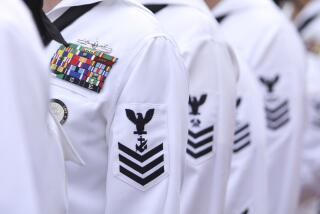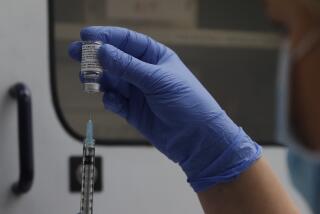Report Opposes AIDS Testing for All U.S. Military Personnel
WASHINGTON — An advisory board of medical experts, in a confidential report to Pentagon health officials last month, concluded that there is no justification “at this time” for screening the blood of all active-duty personnel for an antibody associated with AIDS.
The report, released late Friday under the Freedom of Information Act, was prepared by the Armed Forces Epidemiological Board. Its findings conflict with the desire by some military leaders to begin screening all military personnel immediately.
Recommendation Pending
As previously disclosed by sources, the report does recommend that the Pentagon begin screening the blood of all military personnel who are about to leave for an overseas post. That recommendation is pending before Dr. William Mayer, the assistant defense secretary for health affairs, and Deputy Defense Secretary William Howard Taft.
Sources said Friday that the recommendation is sure to be adopted in some form later this month. One source, who requested anonymity, said the recommendation might be amended to include active-duty personnel already deployed overseas in certain countries, as well as those individuals who are about to go to those countries.
The so-called higher-risk countries would include those in areas of the world where other infectious diseases, such as malaria, are still widespread. The idea would be to ensure that individuals who may have AIDS are not exposed to other diseases that could hasten their death.
No Known Cure
AIDS, or acquired immune deficiency syndrome, destroys a body’s immune system and its ability to resist other diseases. There is no known cure. The screening procedure can identify individuals who have been exposed to the disease but cannot determine whether they will contract it.
The Defense Department now has 500,000 personnel stationed outside the United States and its territories out of a total active-duty force of 2.1 million.
Until Friday, the board’s position on screening all active-duty troops had not been known. The board, comprising university and hospital specialists, framed its recommendations last month during closed meetings.
However, the four-page memo obtained Friday states flatly that not enough is known about AIDS to justify massive screening. The board did support the screening of recruits--which began last week--as well as testing blood donations.
More to Read
Sign up for Essential California
The most important California stories and recommendations in your inbox every morning.
You may occasionally receive promotional content from the Los Angeles Times.










